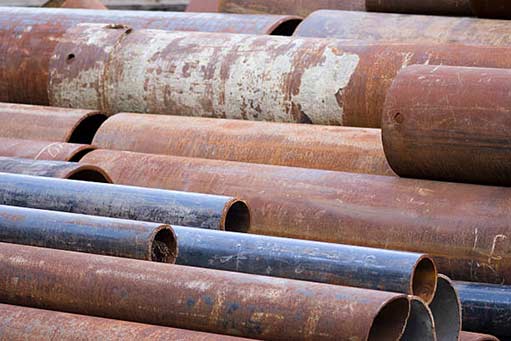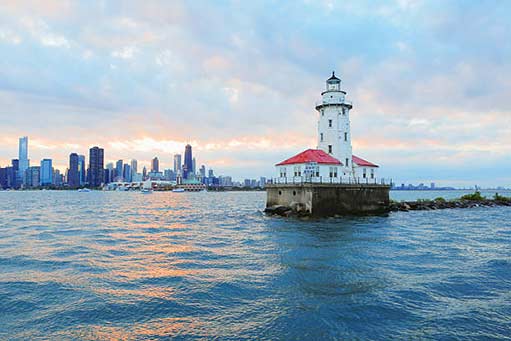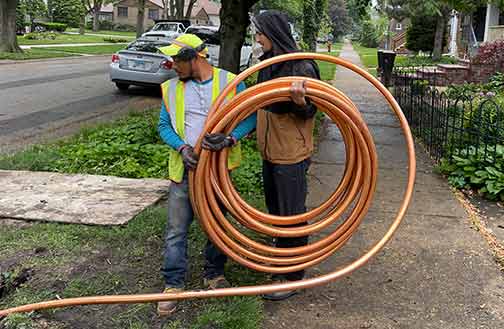The Silent Danger Lurking in Chicago’s Water Supply
Chicago, known as the Windy City, is home to a vibrant population of over 2.7 million people. As these residents go about their daily lives, there is an invisible threat silently making its way into their homes – lead pipes.
Lead pipes are a common feature in many older cities across the United States, including Chicago. These pipes were widely used in the early 20th century due to their durability and affordability. However, the detrimental effects of lead on human health have long been known, and yet, thousands of Chicagoans continue to be exposed to this hazardous substance through their water supply.
The Lingering Dangers of Lead
Lead is a toxic metal that can cause serious health issues, especially in children and pregnant women. When lead pipes corrode over time, lead particles can leach into the water flowing through them. This contaminated water can then be consumed and absorbed by the human body, leading to health problems such as:
- Developmental delays in children
- Learning difficulties
- Behavioral problems
- Lowered IQ
- Increased risk of hypertension
- Kidney damage
Unfortunately, these health risks are often invisible and can take years to manifest, making the impact of lead exposure difficult to detect or link directly to water consumption.

Several factors contribute to the persistence of lead pipes in Chicago’s water supply. One key reason is the sheer age of the city’s infrastructure.
Unveiling the Scope of the Problem
While Chicago’s water supply is regulated and monitored to ensure public safety, the presence of lead pipes remains a significant concern. According to a recent report by the Chicago Tribune, an estimated 400,000 homes in the city still rely on lead service lines to deliver water.
Furthermore, the issue of lead contamination is not evenly distributed across the city. Low-income neighborhoods and communities of color tend to be disproportionately affected, exacerbating existing health disparities and inequalities.
A Deep Dive into the Causes
Several factors contribute to the persistence of lead pipes in Chicago’s water supply. One key reason is the sheer age of the city’s infrastructure. Many of the water systems were built decades ago, and replacing all the lead pipes is a monumental task that requires significant financial resources and coordination.
Another contributing factor is a lack of awareness among homeowners. Many residents are unaware that their homes contain lead pipes or that they can request a free water test kit from the city to assess the quality of their tap water.
Taking Action: Chicago’s Response
Recognizing the urgency of the situation, city authorities have taken steps to address the issue of lead pipes in Chicago’s water supply. The Chicago Department of Water Management has implemented a comprehensive plan to gradually replace all lead service lines across the city.
Additionally, the city has launched educational campaigns to raise awareness about the dangers of lead exposure and the importance of getting water tested. These efforts aim to empower residents with knowledge and equip them with the tools to protect themselves and their families.
Your Role in Protecting Your Health
While the city is making strides towards eliminating lead pipes, individual actions are also crucial in safeguarding public health. Here are some steps you can take:
- Get your water tested: Request a free water test kit from the city and have your tap water analyzed for lead. This will provide valuable insights into the safety of your water supply.
- Use a water filter: Install a certified lead-filtering device on your faucet or use a filter pitcher to remove any potential lead particles from your drinking water.
- Flush your taps: In the morning or after a period of non-use, run your taps for a few minutes to flush out any stagnant water that may have accumulated lead particles.
- Stay informed: Keep up-to-date with the latest information and updates from the city regarding lead water line replacement service initiatives and water quality.
A Collective Effort for a Safer Future
Eliminating lead pipes from Chicago’s water supply is a complex and ongoing process that requires the collaboration and commitment of multiple stakeholders – city officials, residents, and advocacy groups. By working together, we can ensure that access to clean and safe water is a fundamental right for all Chicagoans.
Let us not allow the silent threat of lead pipes to persist in our communities. Take action, spread awareness, and join the movement for a healthier, lead-free Chicago.

